#jo.analysis
Text
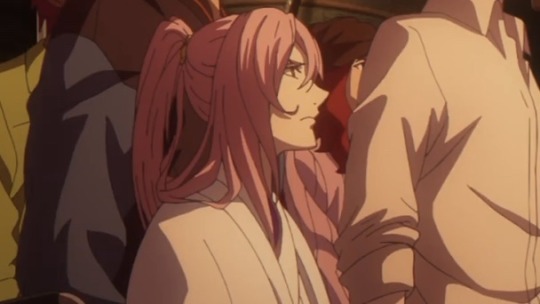

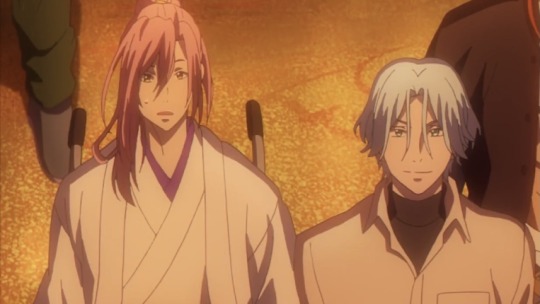
not to be a cherry apologist on main but it’s so endearing how much “affection” (for lack of a better word) he shows towards reki in his race against adam. obviously it would never be true affection, cherry doesn’t have the capacity for that, but there’s a certain concern there that he hasn’t shown for reki in the past. the genuine panic in his voice when he says “is he seriously about to jump off a cliff?!” is a sentiment and tone that we haven’t seen him direct towards reki previously—or anyone, for that matter. clearly there are other factors at work here: it’s very soon after the adam incident so tensions are still high, he’s still recently wheelchair-bound, etc, but there’s definitely something to be said for the way cherry shows that he cares about reki beyond just wanting adam to lose.
#i think about is he seriously about to jump off a cliff all the time#that’s real panic right there. cherry’s CONCERNED#ALSO THAT LAST PICTURE. WHAT THE HELL IS THAT. HOW DOES HE MAKE THE 🥺 FACE#jo.posts#jo.analysis#sk8 cherry blossom#kaoru sakurayashiki#sk8 the infinity#reki kyan
49 notes
·
View notes
Text
episode 23 and the characterization of yukimi, yoite, and miharu
there are several things about e23 (aptly named “activation”) that tear me apart but one of the main ones is how yukimi, yoite, and miharu react to raikou’s death. when they see raikou’s body hit the ground, when they see him let go of shirogamon, they all react in ways that are inconsistent with their characterization thus far in the series, and that’s what makes the scene so meaningful and crucial to the development of both the plot and characters.
we’ll start with yukimi:
yukimi’s character is based on his go-with-the-flow, if-you-can’t-beat-em-join-em attitude. he’s introduced by pointing a gun at a fuuma ninja, and takes the fuuma ninja’s surprise in stride. he explains himself thusly: “times are changin’, so i’m adaptin’. makes sense? it’s the 21st century. the age of the individual” (e3). yukimi prides himself on not being a by-the-book shinobi like tobari. he’s easygoing, if a bit gruff at times. overall, he’s not the type to spiral or get caught up in his own head, and he’s certainly not the type to show the enemy that he’s scared.
but as soon as raikou’s grip loosens on his katana, we see him look horrified.
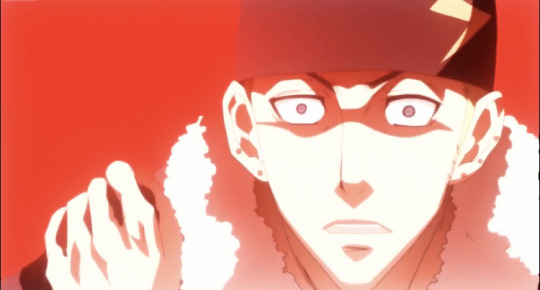
this is an expression we’ve never seen on yukimi before. he’s scared. keep in mind that raikou had injured him just minutes beforehand. he’s still holding the shoulder that raikou slashed. yukimi was brought into the kairoshu with kazuho when he was younger as an attempt to escape an abusive father. hattori took him and kazuho in and raised them almost as if they were his own children (see: ichiki alluding to yukimi being something akin to hattori’s child in e18). if we do the math, raikou joined the kairoshu five years prior to canon era, so yukimi would have been 22. yukimi would have lived in the kairoshu for quite some time. we have to bear in mind that yukimi has known raikou since raikou was fifteen years old. yukimi basically watched him grow up. judging by their easy, familiar dynamic in e9 and the scene in e10 where yukimi tells gau how to approach raikou, the two of them had a good relationship, maybe even a semi-brotherly relationship.
so, applying that to raikou’s death scene, yukimi just watched as the man who replaced his own father murdered the boy he had come to know as something of a brother.
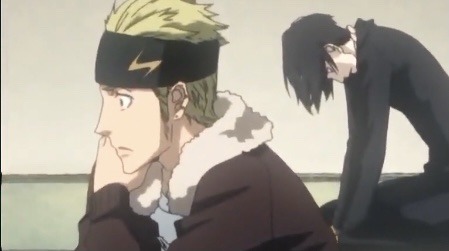
it’s now when all previous characterization departs. yukimi is showing real, genuine fear. he is no longer the easygoing, caustic ninja that we have come to know him as. even when he was injured by raikou, he still had his attitude intact (“so you’re a samurai again, huh?”), but now he’s a husk of that man, and the terror in his eyes reveals that. raikou’s death shocked him enough to lose all of his former bravado.
yoite’s situation is more difficult. leading up to this episode, he’s already been abandoning some of his former characterization, but it’s still in line with his MO. he wants to disappear, and even though his motivations are changing, he’s still yoite. throughout the series, we have seen him kill without a second thought. he says it himself: “i live to kill for the kairoshu.” (e12). he’s introduced as a “monster” (e2). and steps into the role neatly when he tears tobari apart and snaps kouichi’s arm. even as his kira is taking more and more out of him, he continues to use it without much sympathy for those it affects. he’s constantly walking on a “mountain of bodies,” so he’s become desensitized to death (e12).
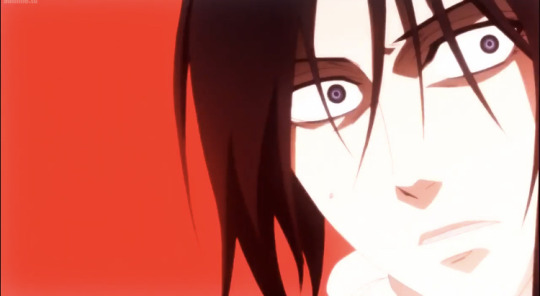
but when we see his face when raikou dies...
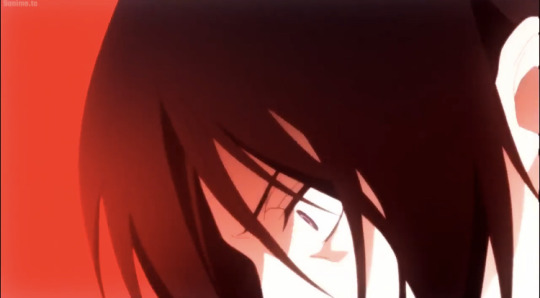
he’s the only person in the room to quickly turn away.
yoite has never shown any aversion to looking at dead bodies prior to this point. his desensitization runs deep, and he’s normally unfazed by them. but it’s this particular body, RAIKOU’S body, that makes him look away. it’s a knee-jerk response. he turns his head and looks at the ground because he can’t bear to look at raikou. even when we see him later, through raimei’s eyes, he still can’t bring himself to look at raikou.
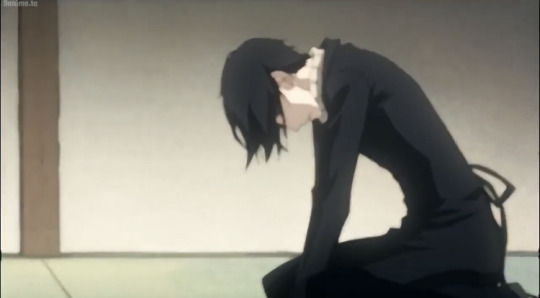
even though my personal belief is that yoite and raikou go way back, i’m focusing on canon here, so in canon, raikou and yoite met for the first time a few months prior to this, and they’ve worked in close proximity to each other since then. their relationship hit a rough patch just before yoite revived gau with his kira, but raikou’s gratitude to yoite only flourished since gau woke up, and it was present in the way he interacted with him. raikou became a protector of sorts for yoite in the last few days of his life, because he had “a debt that needed paying back” (e21). raikou was genuinely kind to yoite at a point in yoite’s life where he needed kindness (regardless of whether or not he necessarily wanted it), and for yoite to see his body on the ground, is (in gau’s words) “too much for any one person to handle” (e20). yoite’s desensitization to dead bodies is shattered when it comes to one of the only people in his life that granted him some semblance of kindness.
miharu. oh, miharu. the master of indifference.
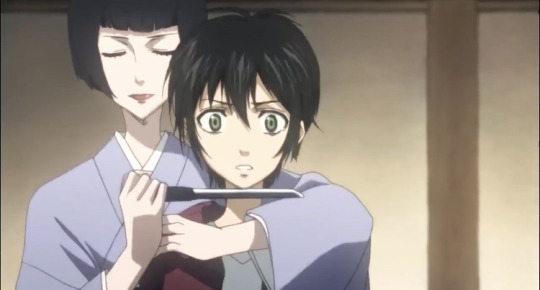
in the beginning of the series, miharu’s main character trait is that he is “apathetic towards everyone and everything” (e1). it’s this apathy that keeps the shinrabanshou from truly and permanently awakening from inside him, as that would require miharu to make a wish according to his innermost desires, and he has none. we see him grow and change throughout the series up to this point as he comes to genuinely care about yoite and yoite’s wish, but he’s still gripping tight to apathy as a coping mechanism to separate himself from everyone else.
miharu and raikou didn’t have a close relationship, but they went on the koga mission together, and raikou liked and respected miharu a lot. he never treated miharu like a child, and never attempted to tell him what he could and couldn’t do (like tobari did). miharu is not as desensitized to death as yoite is, so he’s able to be disturbed by violence, but he’s not completely unfamiliar with the concept. he even partakes in violence himself when necessary (see: escaping from his hotel room in e21). however, when he sees raikou hit the ground, we see something break inside miharu. any last remnants of his previous apathy are forcefully cast aside as he’s forced to look at the body of a former comrade.
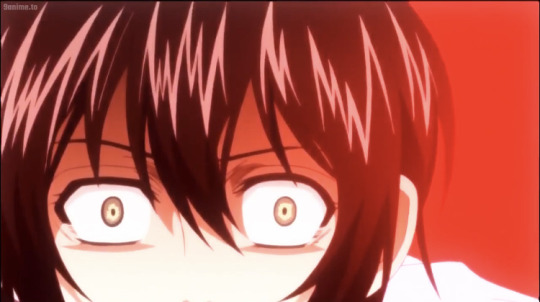
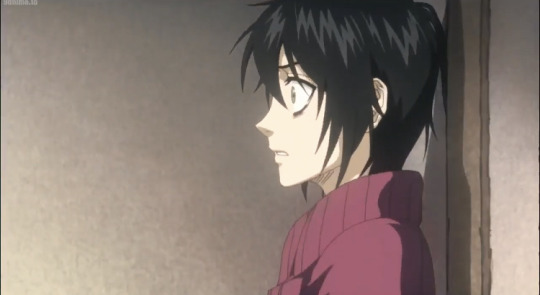
it’s seeing raikou get murdered that finally shakes him up enough to allow the shinrabanshou to take over. miharu is so genuinely scared in that moment, he completely abandoned all the walls he had tried to put up to protect himself, and the fairy is able to take advantage of him.
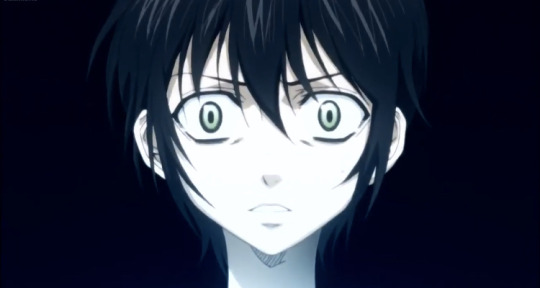
miharu’s apathy dies along with raikou, his pure, unadulterated terror creating a fragile state of mind that the shinrabanshou is able to seize hold of. raikou’s death marks miharu’s abandonment of his previous characterization and makes room for the growth he needs in order to harness the shinrabanshou.
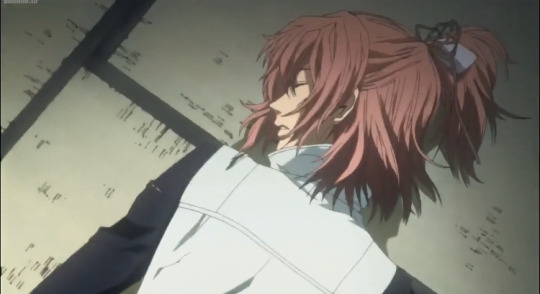
taking all of this into account, it’s still fucked up that they killed anime raikou, but for the sake of the plot and characters, it’s understandable why they did so. raikou dying was the final drop of water they needed to get yukimi, yoite, and miharu’s characters to the point where they overflowed.
#this was so fun to write#i know that no one is going to read it but maybe skim it? for me? 🥺#i do NOT fuck around with content analysis#EVER#jo.posts#jo.analysis#nabari no ou#nno#raikou shimizu#yoite#yukimi kazuhiko#miharu rokujo#anime
20 notes
·
View notes
Text
raikou, raimei, and appearance as familial allegiance
something i’ve noticed: the shimizu siblings’ respective character designs are indicative of their relationship with their family and their pasts.
raimei looks like korin. she looks a LOT like korin, and with her loyalty to her family, that makes sense. her design is similar to her mother’s because she still has pride in where she comes from.
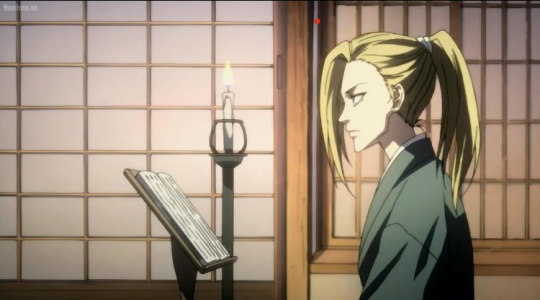
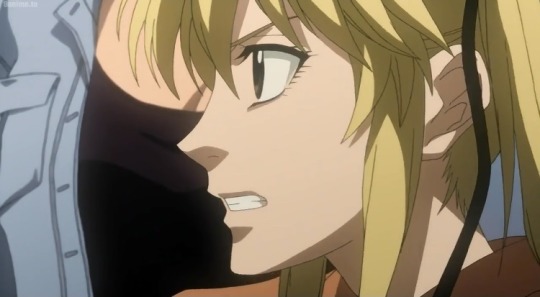
applying that concept to raikou makes sense, as well. he never had raimei’s level of faith and allegiance to their family, so his character design isn’t very similar to either of his parents. he doesn’t have korin’s light hair or somei’s dark hair, and while this could be analyzed as raikou having a MIX of his parents’ hair colors, i think the emphasis should be on the fact that he has NEITHER of his parents’ hair colors. he is not a combination of korin and somei, he is a separate being from korin and somei.
when raimei has that first flashback and we’re introduced to korin for the first time while raikou and raimei stand in front of her with kurogamon and shirogamon, it’s very clear that raimei is korin’s daughter.

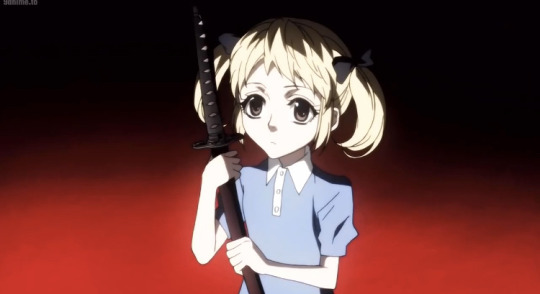
even though we only get a shot of the lower half of korin’s face, her skin and hair color are identical to raimei’s. but when we see raimei and raikou next to each other, raikou looks significantly different from his mother and sister. his hair is darker and he’s wearing his black school uniform while korin and raimei are wearing pale, pastel colors. we never see him wear anything but black in the flashbacks of the night his parents were killed, even while everyone around him (even iroku) is wearing light colors.

raikou’s lack of allegiance to the shimizu family was demonstrated through his character design before we even knew what he had done, and this forced separation from his family continues into present canon era.
raimei still wears her hair the way she did when she was younger: the same two pigtails with visible dark hairties. she carries her past with her because she loved her family and still does to this day. she has no reason to change the way she looks because she wants to keep the remnants of the shimizu family, the inherited features from her parents, on her person and in her life. she has no reason to run away.
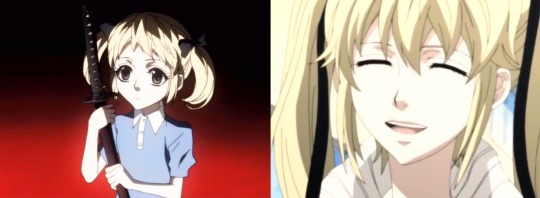
raikou, however, does the opposite. he changes his style of dress and dyes his hair in an attempt to remove himself as much as possible from the shimizu name.
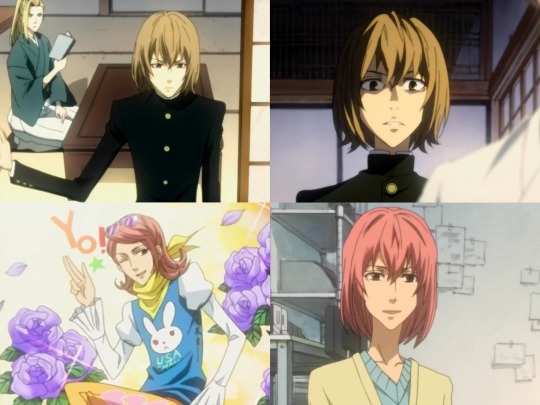
i know that there’s a “reason” he dyed his hair in the manga, but i don’t think that’s entirely the case. raikou was tired of seeing not only his family features, but also his childhood self when he looked in the mirror. to assure and convince himself that he was no longer that fifteen year old boy that killed those closest to him, he changed the way he looked. raikou wants to become unrecognizable to himself and the past he wants to escape. unlike raimei, he has a reason to run away.
in episode 10, gau tells yukimi “it seems the worse [raikou’s] mood gets, the more ridiculous his taste in off-duty clothing becomes.” while to kazuho and yukimi this doesn’t seem to correlate, upon further examination, it’s not too hard to connect. raikou had just gravely injured his own sister, his last remaining blood relative. to manage his crushing guilt, he turned to changing his appearance, something that is evidently a coping mechanism for him. he wanted to become unrecognizable again, to raimei and to himself. to raikou, his appearance is the last thing connecting him to the shimizus, he believes that disconnecting himself from his family will ease the guilt that he feels.

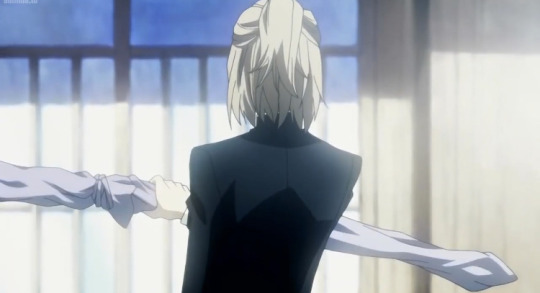
raimei and raikou have very different relationships with the shimizu family, and the extent and depth of their allegiance (or lack thereof) has and always will be reflected in their appearances, regardless of whether they’re aware of it or not. while raimei holds on to the features from departed shimizus that she adored so much, raikou is constantly trying to change them so that he is not only unrecognizable to the ghosts of his victims but also to himself.
#WHEW#yet another long winded anime analysis from jo ratcarney 😔#the way i love the shimizus...#they’re such GOOD characters. like genuinely. they’re so well done#jo.posts#jo.analysis#nabari no ou#nno#raikou shimizu#raimei shimizu
17 notes
·
View notes
Text
one of my favorite moments in tgm is directly after grinpayne, barkilphedro, and ursus reenact the way grinpayne’s face was cut. in the background, david and angelica look absolutely horrified. david has the blade of bilboa in front of him as if it’ll shield him from the terrors that he just saw grinpayne re-experience. he looks stricken.
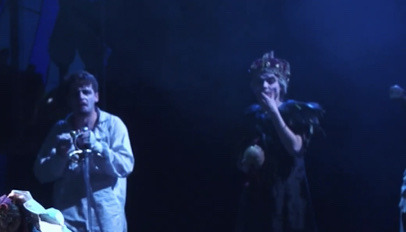
then, when they watch grinpayne take off the garter and decide to kill barkilphedro, david hands him the blade.

even though david has witnessed grinpayne “take” from him everything he once held dear, he now understands that he deserves closure. he understands that grinpayne deserves revenge, and that only proves that what grinpayne’s parents fought for is true. to look into the eyes of someone that is maiming you and see that they’re the same as you—that is strength. and david achieves it by the end of the musical.
#never shutting up abt this ever!!#jo.posts#the grinning man#david dirry-moir#david tgm#grinpayne tgm#angelica tgm#the grinning man musical#jo.analysis#gwynplaine trelaw
97 notes
·
View notes
Text
one of the most heartbreaking parts of tgm is grinpayne’s genuine belief that if dea could see, she wouldn’t love him anymore. even though dea spends her days living for him, helping him and holding him and caring for him, he still can’t believe that she’d love him just as much if she could see his broken face.
#IM FEELING SOME GRINPAYNE/DEA FEELINGS..#jo.posts#the grinning man#the grinning man musical#jo.analysis#gwynplaine trelaw#grinpayne tgm#dea tgm#grinpayne and dea
80 notes
·
View notes
Text
thinking about the modifiers “poor” and “broken” in hadestown and tgm respectively
44 notes
·
View notes
Text
no matter how many times i watch it, the way grinpayne spontaneously kisses dea after he reads josiana’s letter will always dissolve me. he just read a letter that shifted his past into clearer view, and even though it’s what he’s always wanted, he’s frightened. he’s scared, so he goes and does what makes him feel grounded in reality. he kisses dea because he knows that that is the one thing that will bring him back to earth. she’s his rock, and he needs her touch to make him feel like everything will be alright.
#don’t fucking look at me im YEARNING#jo.posts#jo.analysis#grinpayne tgm#dea tgm#jagged and blind#grinpayne#gwynplaine trelaw#the grinning man#the grinning man musical#grinpayne x dea
44 notes
·
View notes
Text
alright the scene in e17 that i posted earlier is so much more than that one coughing up blood part. yoite and yukimi are fighting like for Real. but there’s this one point where yukimi points his gun at yoite and we see his face. he’s fucking scared.

he sees yoite’s face and he knows that he’s no match for a kira user. he’s seen yoite in combat. he taught him how to fight. in this moment, yukimi is terrified because he knows he can’t win. he doesn’t know why yoite is so upset with him. the kid is unpredictable and powerful as all hell, and he is angry. yoite follows him to the rooftop and finally reveals why he’s upset: yukimi dragged hana, an outsider, into the nabari world. at that point, hana is one of the only people that has been genuinely, openly kind to yoite, and seeing yukimi threaten her was the last straw. he cares about her, and yukimi put her in danger.
that alone would have been enough to make yoite upset, but yukimi was the one that told yoite to never involve outsiders in the nabari world. he said that that was one of the rules of nabari. and then he broke yoite’s trust when he broke that rule. like hana, yukimi is an important person in yoite’s life. to watch him knowingly disobey a law of nabari shook yoite’s world.
even when he collapses and he can barely choke out the words, he musters the strength to ask yukimi “how could you?” yoite is so broken by this betrayal that he finds the resolve to ask yukimi how he could possibly lie, even when he’s barely hanging on to consciousness. yoite has been betrayed by family before, and even though what yukimi did was nothing in comparison to what his parents put him through, yoite feels the aftershocks of what happened in his past. yukimi is the closest thing to family yoite has, and he betrayed him. yukimi was absolutely right to be scared.
#feat. miharu shouting at the end#ive watched this scene so many fucking times and it kills me each and every goddamn time.#the weakness in his voice..#IN JAPANESE IT’S ‘’you’re so dishonest. you’re so dishonest yukimi.’’#and even though yukimi has a GUN POINTED AT HIM he’s still concerned. he’s still yoite’s guardian and he knows yoite needs help.#fucking END ME#nabari no ou#jo.posts#jo.analysis#jo.vid#video#yoite#yukimi kazuhiko
9 notes
·
View notes
Text
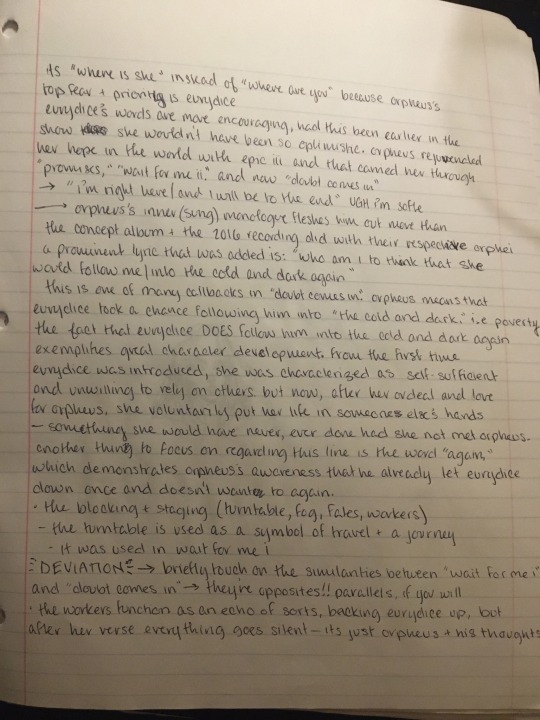

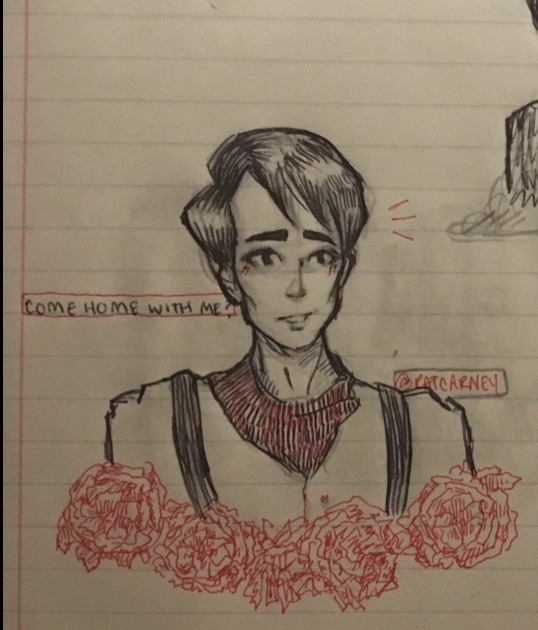
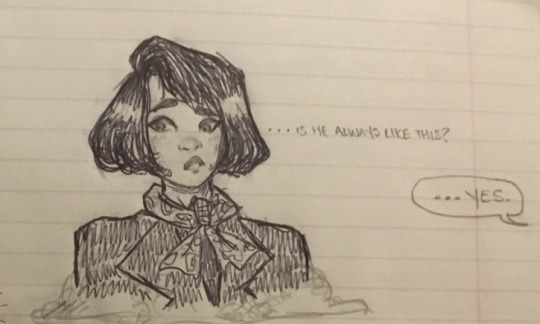

i was looking through a notebook from this time last year, and i found some of the very first hadestown doodles i’ve ever done (and quite a bit of analysis). all of these were done in this particular lecture class that i HATED. this was right after i saw the show for the first time. i had no fuckin idea what was coming :”)
#theres so much more and ill rb with it later#jo.posts#jo.art#jo.analysis#hadestown#hadestown bway#hadestown musical#hadestown broadway#orpheus#eurydice#hermes
96 notes
·
View notes
Text
i know i just went on a massive rant on how much i resent something’s going to change while answering @maryloohoo’s ask BUT now i will list what i do genuinely like about it because i’ve been listening to it on repeat for a half hour to write said rant:
- louis’s voice on “dea, you love someone you can’t even see” is desperate and pleading and has the perfect mix of “i want to protect you” and “you deserve better than me.” it would be a hard-hitting line by itself, but combined with sanne’s indignant, equally-pleading “hey!” it’s a masterpiece in a sea of disorganization.
- the opening to the song is very fitting. very pretty. evokes the melody that plays in the bristol version after the fair is burned down when grinpayne enters in the hall of portraits.
- “you did keep one promise, you kept me alive!” is very good work on sanne’s part. the shift on the word “alive” from singing to crying out is lovely.
- “what do you dream of, dea” is unbearably sexy.
- i’m immediately infatuated with any incarnation of the line “your thoughts are scorching the air about your head,” so the first line is very good.
- louis’s voice on the word “world” when he sings “in a world full of dreams, somewhere over the sea!”
- something’s going to change brings an ocean motif into view, and i appreciate that a lot, as it links grinpayne to his mother more.
26 notes
·
View notes
Text
in brand new world of feeling, when josiana tells grinpayne she loves him, he repeats the word “love.” he’s taken aback, almost scared. as of this point in the musical, the only person we’ve heard him use the word “love” with is dea, during beauty and the beast.
#I THINK ABOUT THIS ALL THE TIME...#jo.posts#the grinning man#the grinning man musical#duchess josiana#grinpayne tgm#grinpayne#gwynplaine trelaw#jo.analysis
25 notes
·
View notes
Text
part one of the questions section of the hadestown panel that @ivegotaheadlineforyou and i did!! here, we discuss the fates and the difference between antagonism and villainy.
#I STILL HAVE STRONG OPINIONS ON THIS!!!!!!!!!!!!#more of these are coming!!#jo.vid#jo.posts#broadwaycon#hadestown#hadestown musical#hadestown bway#hadestown broadway#the fates#payton tag#video#jo.analysis
79 notes
·
View notes
Text
question: in the song “why we build the wall,” it’s a circular argument, because at the end they say, “what do we have that they should want, we have a wall to work upon,” so the answer to “why we build the wall” is almost “because we build the wall.” so i was just wondering if you could speak about the cyclical themes and how people in power justify what they’re doing.
#welcome to duloc eurydice#jo.vid#jo.posts#payton tag#hadestown#hadestown musical#hadestown bway#hadestown broadway#jo.analysis#video#broadwaycon#hades
69 notes
·
View notes
Text
i’m having Big Feelings about that part in road to hell where hermes says “on the road to hell there was a railroad line/and a poor boy working on a song” and we hear orpheus sing the “la lalala la lala.” this is the first time we hear orpheus’s voice in the whole show, and it could not have been a more perfect introduction. first of all, it’s so fitting that we hear his melody before any words, because that’s what carries his character: the lalalas. but putting aside the actual levelheaded analysis for a second, he sounds so dreamy and focused on his song?? his voice is so light but it’s still apparent that he’s concentrating, he’s working hard to finish this gorgeous song, and it’s beautiful?? and so airy?? it really evokes the idea of orpheus being “touched by the gods,” because everything about the little melody screams “heavenly.” i love orpheus with my whole heart sjdjflkdlskd
#HE!!#i dont have enough words to explain how much i love this boy#i just. i love him#god#hadestown#hadestown obcr#orpheus#hermes#jo.posts#jo.analysis#reeve carney#andré de shields#hadestown musical#hadestown bway#hadestown broadway
322 notes
·
View notes
Text
doubt comes in: a complete analysis
first of all, for all intents and purposes, london!orpheus has no rights, and here’s why:
london!orpheus has a self-assured confidence to him. he does not pause before dialogue—he does not need to. “come home with me” is driven solely by confidence that eurydice will definitely, 100% fall for him. hermes mentions that “eurydice knew how to survive,” but “orpheus knew how to live.” orpheus’s drop-to-his-knees, spur-of-the-moment, pseudo-proposal has lively arrogance behind it.
broadway!orpheus, however, is the exact opposite. he is constantly driven by dreaminess and a perpetual, underlying anxiety. there is absolutely no arrogance whatsoever behind his characterization.
while confident london!orpheus is, admittedly, VERY sexy, he is unable to bring the same emotion to songs such as “wait for me,” “if it’s true,” and “doubt comes in” (the latter especially!!). he starts the show very sure of himself and stays that way through act i and most of act ii. while one may think that this makes his total breakdown in doubt comes in more meaningful, it does not. it’s like orpheus has backed himself into a corner emotion- and confidence-wise and it would be uncharacteristic to fall straight to rock bottom after being strong and self-assured for the whole show thus far.
the best part of broadway’s dreamy, distracted orpheus is that the audience gets a chance to watch his belief in himself grow gradually until his turning point songs (“wait for me,” “if it’s true”) cement his newfound confident characterization in their minds. they have come to root for the underdog and are attached to his character. but then, starting at “wait for me ii,” as hermes is warning orpheus about the dangers of his journey with eurydice to the surface world, the audience recognizes a note or two of panic within orpheus akin to those they saw in songs such as “chant” and “a gathering storm.”
without witnessing how far orpheus has come, the audience wouldn’t be as broken up about his eventual failure to get the love of his life back. one could even argue that eurydice was the one that salvaged his confidence (probably during that super sweet part in “all i’ve ever known”) and cultivated it to be what the audience sees in “wait for me,” aka the ultimate declaration of his love. this argument would make it even more painful when she dies and, consequently, all of orpheus’s belief in himself dies with her.
at its core, it’s playing with the audience’s favor. london!orpheus already has the audience’s attraction, but the ever-anxious broadway!orpheus gained the audience’s sympathy throughout his story. london!orpheus’s loss isn’t as great because we know he can function on his own. we’ve seen it in songs like the london version of “livin’ it up on top.”
broadway!orpheus has demonstrated that eurydice is the only thing keeping him together. he literally gets torn nearly to shreds once he enters the underworld and she is separated from him during “papers.” the driving point behind all of his actions is to right his wrongs and get eurydice back. so his loss is MONUMENTAL compared to assertive, flashy, london!orpheus’s because the audience knows that he genuinely cannot handle himself without her.
keeping that in mind, let’s continue into “doubt comes in.”
“doubt comes in,” the penultimate song in the musical, is an illustration of orpheus’s complete mental collapse. it is symbolic of the destruction of all the love and hope for the world that he previously held. let’s get into the details.
the evolution of the beginning of the song is as follows:
a. in the concept album, after a VERY lengthy (but necessary for setting the scene) two-minute intro, orpheus himself starts the song. the opening lyrics are “doubt comes in and strips the paint/ doubt comes in and turns the wine/ doubt comes in and leaves a trace of vinegar and turpentine.” these lyrics are sung with the same otherworldly disconnectedness in which justin vernon’s orpheus sings everything. he continues with “where are you?/ where are you, now?” which is self-explanatory.
b. in the 2016 cast album, the fates start off with the same lyrics. this is attributed to their characterization from early on in the musical: “they [are] always singin’ in the back of your mind.” they function as orpheus’s anxieties and (self-)doubts personified. damon comes in a little later with his trademark wavering tenor singing “doubt comes in and all falls silent/ it’s as though you weren’t there.” this is fleshing orpheus out a little more, voicing his main fear—that eurydice isn’t behind him, that this is all a trick.
c. reeve’s “doubt comes in” is the most dramatically changed. they changed it so that it would fit his character more, and they did so EXPERTLY. reeve’s broadway!orpheus very clearly suffers from severe anxiety. he’s sensitive and jumps at the slightest sound. the way he neglects his relationship with eurydice in favor of working on the song is not malicious, but charged with fear. it’s not intentional, he just has a habit of shutting everything out when working on something important. he’s never been in a relationship before, so he doesn’t consider that maybe, eurydice needs him as much as he needs her. but i digress. reeve’s “doubt comes in” starts with the repetition of his lalala melody—the exact same one that the audience has come to associate with him. he sings this to himself both for comfort and in the feeble hope that eurydice will hear it and know where to follow him (akin to theseus making a trail of ariadne’s thread to help him escape the minotaur’s labyrinth). in the beginning of the show (“come home with me”), orpheus describes the melody as something that “takes what’s broken and makes it whole,” and he’s using his lalalas as just that. while that is heartbreaking enough to begin with, reeve’s trembling, almost-faltering falsetto (reevesetto, if you will) adds a layer of suspense and desperation that damon and justin can only dream of.
the instrumental:
- every version of doubt comes in has a variation of the same instrumental. the haunting strings fill the theatre with a palpable fear, leaving even the people who don’t know the myth filled with a sense of dread.
- the truly striking part about the instrumental, though, is the drumbeat. it’s meant to symbolize orpheus’s heartbeat pounding in his ears, and has the same effect on the audience.
eurydice’s verses:
- eurydice’s first line in both the concept album’s “doubt comes in” and the 2016 one is “orpheus, you’re shivering/ is it cold or fear?” one could argue that these are the most tender lyrics exchanged between the lovers throughout the whole musical. it demonstrates eurydice’s intimate knowledge of her lover whether it’s justin’s determined orpheus, damon’s confident orpheus, or reeve’s fearful orpheus (that is, if they had included it in the broadway version). in some ways, it is a response to the orpheus’s line prior to it: “where are you now?”
justin and anaïs: these two have the energy of a couple that has faced the trials, come out victorious, and will do so again. anaïs’s steady, haunting voice does not serve as an accessory to justin’s layered vocals, her eurydice is as determined as justin’s orpheus. they know that they will be fine as long as everything goes according to plan (spoilers: it doesn’t). when anaïs sings “orpheus, you’re shivering/ is it cold or fear?” it’s like she’s checking up on him, just to be safe. it’s not so much fear in her voice as it is a simple question, as if her next words would be “just checking in. keep going, baby, we’re almost there.”
damon and nabiyah: their relationship is more tentative. it was fractured when eurydice sold her soul, and it’s just starting to be repaired. when nabiyah sings “orpheus, you’re shivering/ is it cold or fear?” there is more lingering anger in it than what anaïs offered. it’s seen in the way she hisses his name, remaining on the last consonant for longer than she used to. however, after a beat, once she realizes that he’s shaking, (implying that either 1. she’s following close enough to see him tremble, or 2. she recognizes the wavering in his voice as a red flag, which is adorable because that means she was intentionally looking for anything that would indicate that orpheus wasn’t feeling as confident as he usually did as a precaution because she knew how fast things could spiral from there) her tone softens. she melts and offers him words of reassurance “just keep singing/ the coldest night/ of the coldest year/ comes right before the spring.”
reeve and eva: i will always (always!) be mad that they omitted that line from the broadway production. it had so much potential considering that eva follows so far behind reeve throughout the song. in her bold, protective voice, the mere singing of orpheus’s name would have 100% knocked me to the ground. and reeve’s orpheus would be most likely to display such symptoms. even the audience member in the farthest seat from the stage could tell that reeve was shaking as he walked forward on the turntable, he just gave off that aura (it’s free real estate good acting). of course eurydice would notice that he was afraid.
lyric changes (in no particular order):
a. in the broadway version, the “where are you now” was changed to “where is she now,” reiterating the fact that eurydice is orpheus’s number one priority (and source of fear)
b. in place of the “you’re shivering” line, broadway!eurydice’s words are more encouraging. had this been earlier in the show, she wouldn’t have been so optimistic. orpheus replenished her hope in the world with “epic iii” and that’s what carried her through “promises,” “wait for me ii,” and, of course, “doubt comes in.” she says “orpheus, are you listening?/ i’m right here/ and i will be ‘til the end” for the first verse and “orpheus, you’re not alone/ i’m right behind you/ and i have been all along” for the second, right before he looks back.
c. orpheus’s inner (sung) monologue fleshes him out more than the concept album and the 2016 recording ever did with their respective orphei. one of the most prominent examples of this is the lyric “who am i to think that she would follow me into the cold and dark again?”
d. this is one of the many callbacks in “doubt comes in.” orpheus means that eurydice took a chance in following him into the “cold and dark,” i.e. poverty. the fact that she does it AGAIN exemplifies great character development. from the first time eurydice was introduced, she was characterized as self-sufficient and unwilling to rely on others. but now, after all she’s been through, she willingly puts her life in someone else’s hands—something she would have never, ever done had she not met orpheus. the fact that orpheus says “again” demonstrates his awareness (something else he has gained since the beginning of the show) that he already let eurydice down once and he does not want to again.
callbacks:
a. “the wind is changing...” this is sung by the fates in the chorus and is reminiscent of “a gathering storm.”
b. “la lala la lala la la...” this is orpheus’s musical motif. it symbolizes togetherness and hope. however, while all other times he is eventually joined by the ensemble, this is different. he is singing his melody into the dark and hoping against hope that someone will answer. no one does.
c. “i used to see the way the world could be/ but now the way it is is all i see...” orpheus is hope personified. he symbolizes all that is good, he never sees the bad in anyone and on the off chance that he does, he doesn’t fixated on it. but here, he’s rethinking his worldview. the darkness has seeped into his soul, rendering him terrified and doubtful.
d. “it’s you/ it’s me/ orpheus/ eurydice” this is a callback to “come home with me ii,” which sucks because it’s uhhhh painful.
conclusion: jo found dead in miami.
#WHEW this took a while#worth it though#I think about this every day#doubt comes in#jo.analysis#analysis#hadestown#damon daunno#justin vernon#reeve carney#orpheus#eva noblezada#anais mitchell#nabiyah be#eurydice#orpheus and eurydice#hadestown musical#hadestown broadway#hadestown bway#jo.posts
505 notes
·
View notes
Text
things i’m disproportionately upset about: orpheus getting a little hysterical on “is this a trap [...]/is this a trick [...]” because everything is too much. the fates are hissing in his ears and he’s losing sight of what’s around him and the lalalas aren’t helping when they always have before. this is beyond doubt, this is panic. orpheus is terrified. he has clung to his view of the world for so long and even deluded himself into thinking that he could fix it, only to have his hope stolen from him at the very point when he needs it most. orpheus is losing hope, and you can hear it in his voice and the way he can barely contain a scream of panic and frustration.
#god....#i hate reece carvey so much yall#i hate him#he had NO RIGHT to do this#hadestown#jo.posts#hadestown obcr#jo.analysis
217 notes
·
View notes